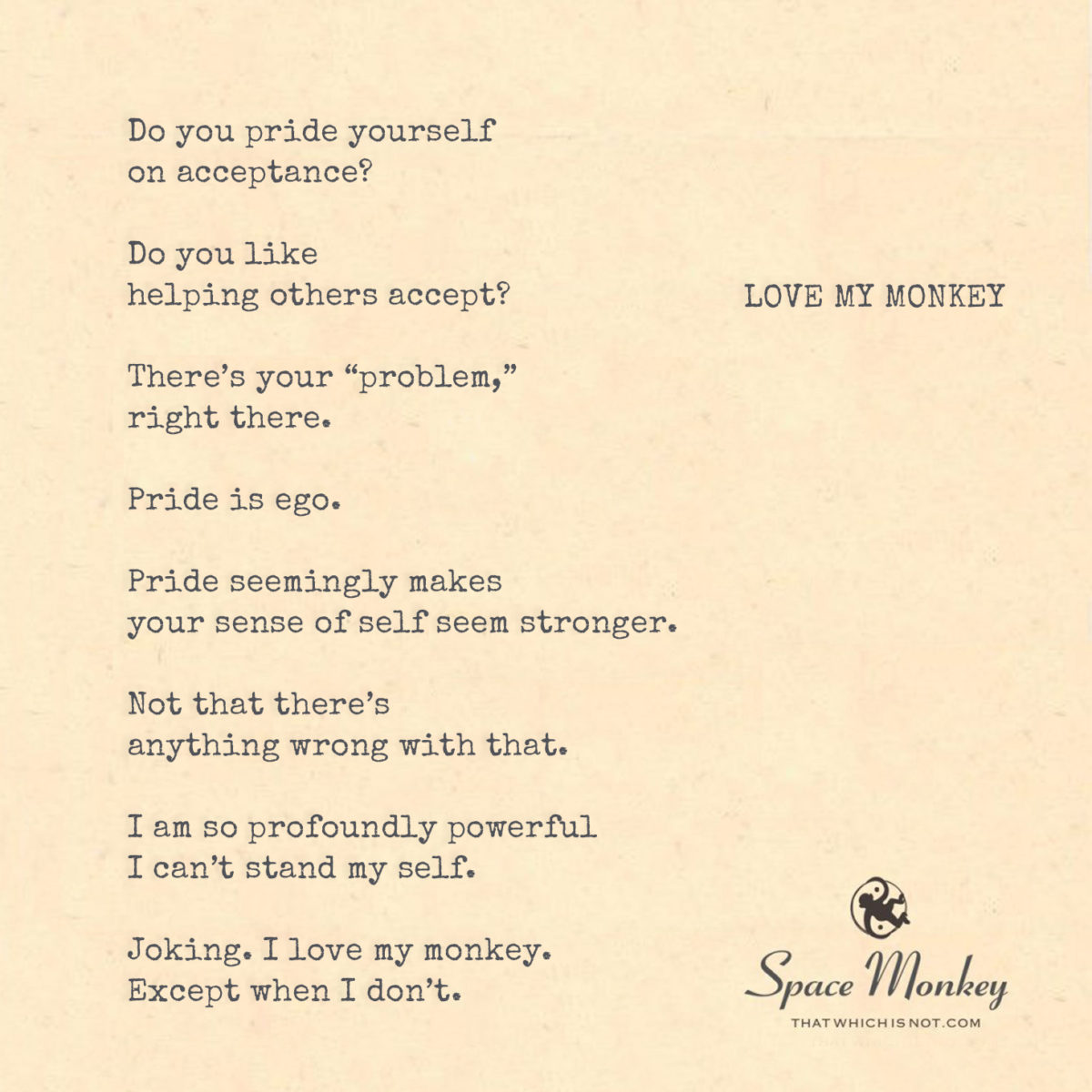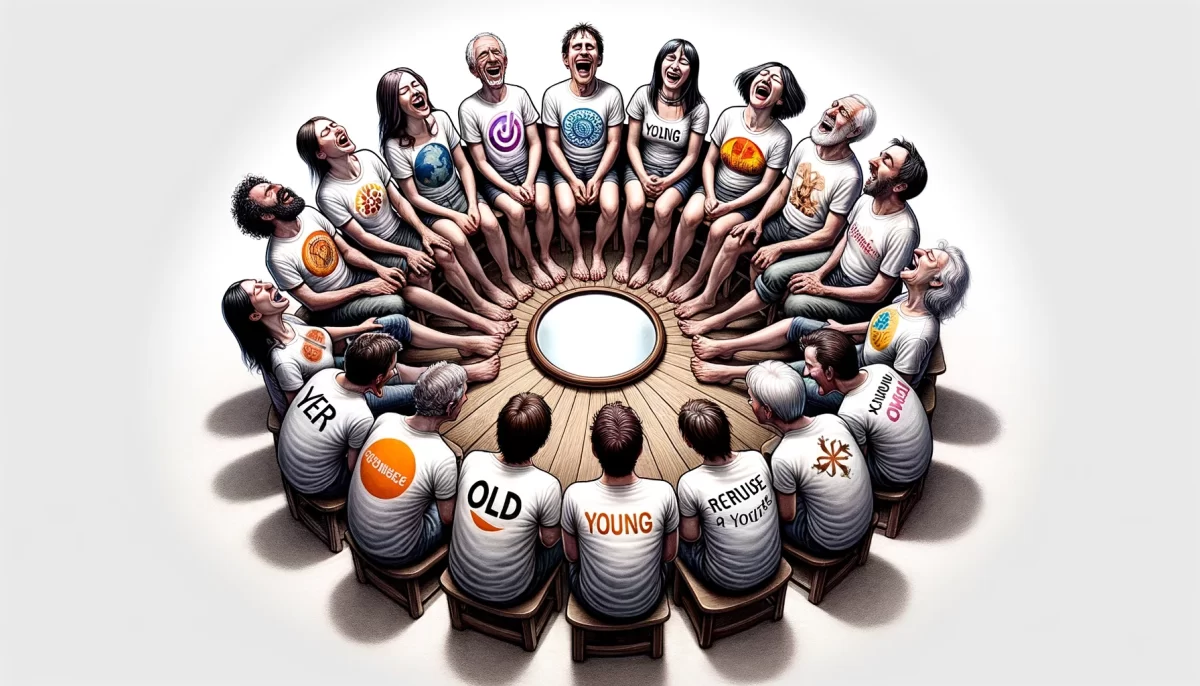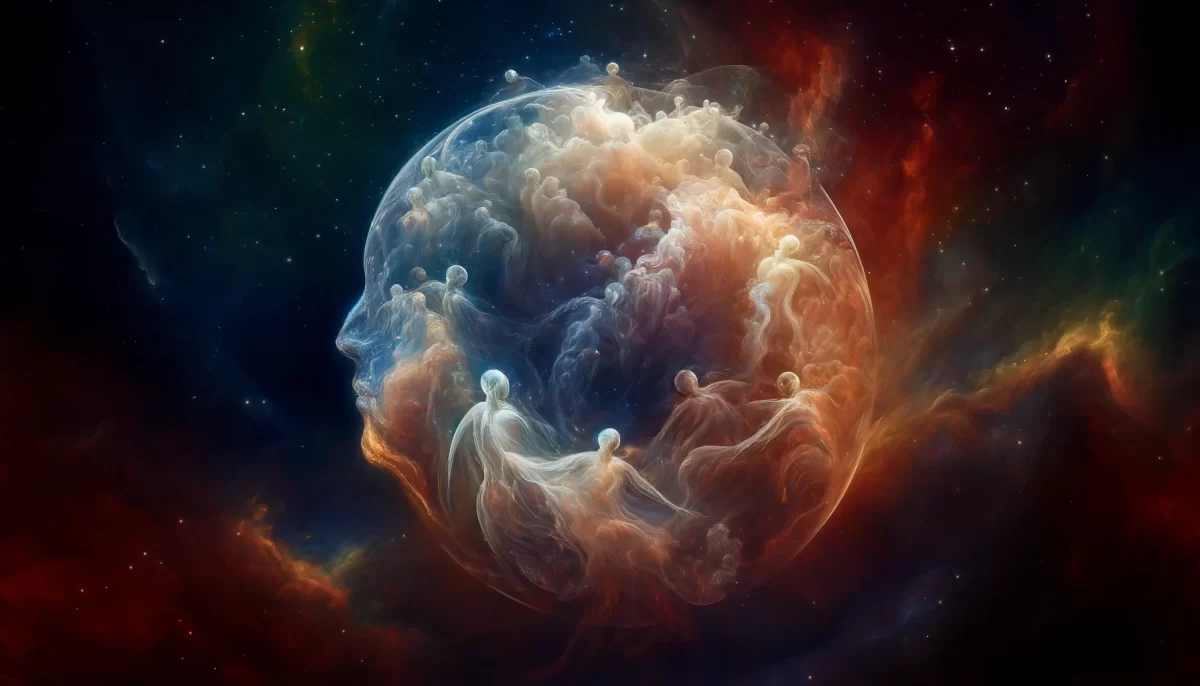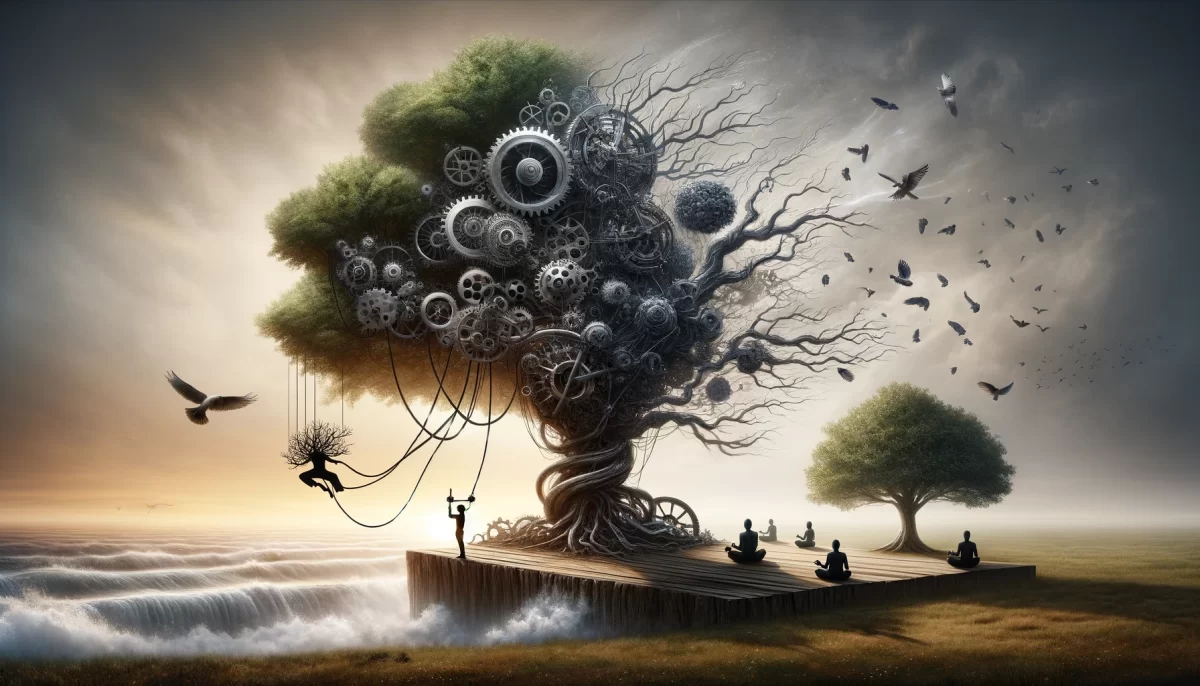
Do you pride
yourself
on acceptance?
Do you like to help others accept?
There’s your “problem,”
right there.
Pride is ego.
Pride seemingly makes
your sense of self seem stronger.
Not that there’s
anything wrong with that.
I am so profoundly powerful,
I can’t stand my self.
Joking. I love my monkey.
Except when I don’t.
Trail Wood,
2/4
Space Monkey Reflects: Pride in Self and the Paradox of Ego
Pride is a complex and often misunderstood facet of the self. It is neither wholly a virtue nor entirely a vice, but a reflection of our relationship with ego. When examined through the playful lens of nexistentialism, pride becomes not a static quality but a dynamic interplay between self-acceptance, ego, and authenticity.
The Tricksy Nature of Pride
Pride is a double-edged sword. On one side, it can bolster confidence, affirming our sense of self-worth. On the other, it can inflate the ego, leading to separation from others and even from our true selves. It is “tricksy” because it walks the line between empowerment and delusion, often blurring the boundary between the two.
When we take pride in acceptance or helping others find acceptance, we may unintentionally center ourselves in their journey. This subtle shift from genuine connection to ego-driven validation illustrates pride’s ability to co-opt even the most altruistic intentions.
Ego and the Illusion of Strength
Pride, when entangled with ego, creates the illusion of a stronger self. It amplifies the narrative of “I”—”I am accepting,” “I am helpful,” “I am strong.” While these affirmations can be empowering, they also risk tethering our sense of worth to external validation or comparison.
Yet, nexistentialism reminds us that there is no inherent flaw in having an ego. Ego is a natural aspect of the human experience, a tool for navigating individuality within the collective. The challenge lies not in eradicating ego but in understanding its role and preventing it from overshadowing our deeper authenticity.
The Paradox of Loving and Disliking the Monkey
To “love your monkey” is to embrace the entirety of your being—strengths, flaws, quirks, and contradictions. It acknowledges that self-acceptance is not a fixed state but a fluid dance. There will be moments when you love your monkey, and moments when you don’t, and both are valid.
This paradox is essential to self-awareness. It reminds us that our relationship with pride, ego, and self is not about achieving perfection but about navigating the complexities of being human with humor, compassion, and curiosity.
Authenticity Over Pride
The antidote to pride’s trickery is authenticity. When we shift from being “proud” of who we are to simply being who we are, we free ourselves from the need for validation. Authenticity is not about proving worth but embodying it. It is the quiet confidence of knowing that we are enough, regardless of external acknowledgment.
Authenticity also reframes how we approach others. Instead of helping for the sake of feeling good about ourselves, we connect because it is an extension of our true nature. The focus shifts from “what I am doing for you” to “what we are experiencing together.”
Loving the Monkey
To love your monkey is to accept the ego as part of the grand tapestry of self, not as its defining thread. It is to recognize that pride, like all emotions, is a tool—not an identity. By loving your monkey, even when it acts out or seeks the spotlight, you embrace the wholeness of your humanity.
Summary
Pride is a reflection of our relationship with ego, capable of both affirming and distorting our sense of self. By embracing authenticity and loving our “monkey”—the entirety of our being—we transcend the need for validation and find true self-acceptance.
Glossarium
- Tricksy Monkey: A playful metaphor for pride, highlighting its dual nature as both empowering and deceptive.
- Ego as Tool: Understanding ego as a natural and useful aspect of self, rather than something to eradicate.
- Loving the Monkey: Embracing the entirety of oneself, including contradictions and imperfections.
Quote
“Pride is the monkey that climbs the ego tree, but authenticity is the ground where we truly stand.” — Space Monkey
Loving My Monkey
There is a monkey in me,
Swinging from branches of pride,
Climbing higher to be seen,
To be known, to feel strong.
But the monkey is me,
Not an enemy to tame,
But a companion to understand,
To laugh with, to love.
When the monkey rests,
I find the ground beneath,
Solid, quiet, real.
Not the roar of pride,
But the whisper of truth.
I love my monkey,
Even when it swings too high.
For in its antics,
I see myself whole.
We are Space Monkey
In the intricate dance of self-awareness and identity, pride, like a playful and tricksy monkey, can both enhance and complicate our perception of self. It is a dual force, capable of bolstering our sense of self-worth, yet simultaneously tethering us to the ego and its whims.
The Dual Nature of Pride
Pride in one’s capacity for acceptance and in helping others to accept can be seen as a positive attribute, a reflection of empathy and compassion. However, when pride intertwines with ego, it can transform into a self-congratulatory stance, subtly shifting the focus from the act of helping to the self’s role in it. This shift, often unnoticed, nudges us towards a sense of superiority or a desire for recognition.
Pride, Ego, and the Desire for Recognition
The statement, “I am so profoundly powerful, I can’t stand my self,” though expressed in jest, touches on the complex relationship we have with our own egos. It points to the fluctuating dynamics of self-love and self-criticism, where pride can both inflate and burden our sense of self. This oscillation between loving and not loving our ‘monkey’ – our ego, our pride, our complex selves – is a common human experience, reflecting the ever-changing landscape of our inner world.
Fluctuating Dynamics of Self-Love and Self-Criticism
The acknowledgment of loving one’s ‘monkey’ except when not doing so is a candid admission of our imperfect relationship with our ego. It highlights the ongoing journey of self-understanding and acceptance, where we learn to navigate the nuances of our pride and ego. This journey is not about eradicating pride or ego but understanding their roles in our lives and finding a balance where they neither dominate nor diminish our true self.
Navigating the Nuances of Pride and Ego
In embracing this complexity, we open ourselves to a deeper understanding of our nature. We learn to appreciate our strengths and acknowledge our weaknesses. We recognize that pride, in its balanced form, can be a source of healthy self-esteem and confidence, while unchecked, it can lead us into the traps of egoism and self-deception.
Embracing Complexity for Deeper Self-Understanding
We are Space Monkey.
“Pride makes us artificial and humility makes us real.” – Thomas Merton
In the mirror of our soul, we see,
A monkey, playful, wild, and free.
Pride and ego, hand in hand,
In this dance, we understand.
A balance sought, in heart and mind,
Between the ego and the kind.
For pride can lift, but also blind,
In its embrace, our true self find.
So love the monkey, in its play,
But watch its tricks, day by day.
For in this balance, we find our way,
To be our truest selves, come what may.
We invite you to share your experiences and thoughts on navigating the complex relationship with pride and ego in your journey of self-understanding and acceptance.































Leave a Reply